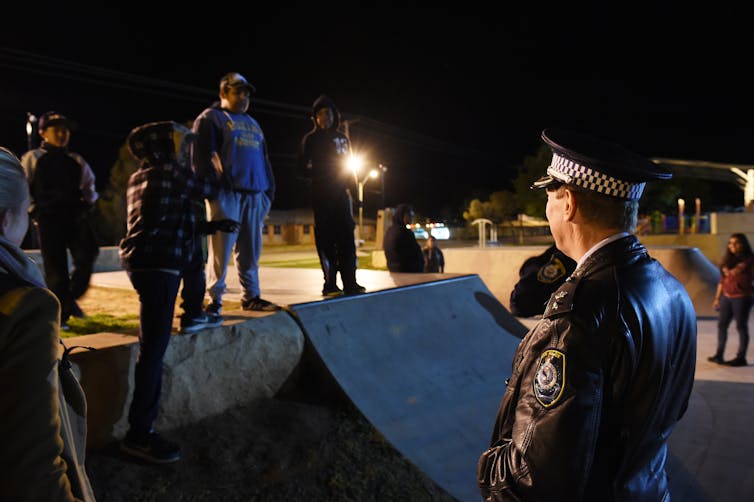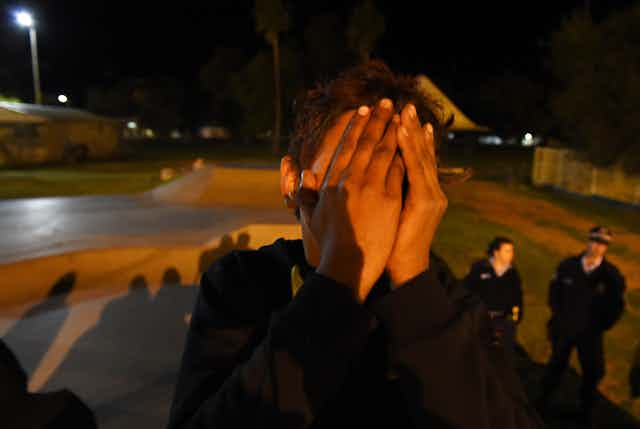In recent weeks, the case of Rosie Anne Fulton, a young Northern Territory Indigenous woman with foetal alcohol spectrum disorder, has again attracted media attention. Rosie was imprisoned for 21 months in Eastern Goldfields Regional Prison in Western Australia after being found unfit to stand trial on charges of reckless driving and motor vehicle theft.
Since her release in 2014, Rosie has been in and out of prison, without stable accommodation. Her guardian, former Territory police officer Ian McKinlay, says the lack of appropriate government support means Rosie will once again be “abandoned to a perilous existence and imprisonment”.
Rosie’s case highlights how the system is failing Indigenous people with foetal alcohol spectrum disorder.
Parliamentary committees have found Australia’s response to foetal alcohol spectrum disorder “lags behind other countries” and that there is “a great need for diversion programs which redirect individuals who come in contact with the criminal justice system”.
To begin addressing the needs of Indigenous young people with foetal alcohol spectrum disorder, the criminal justice response must focus on diversion into Indigenous community-owned-and-managed structures and processes.
What is foetal alcohol spectrum disorder?
Foetal alcohol spectrum disorder is a non-diagnostic umbrella term encompassing a spectrum of disorders caused by prenatal alcohol exposure. That is, disorders a person may be born with if their mother consumed alcohol during pregnancy. The disorders on the spectrum range from mild to severe, and include diagnosis of foetal alcohol syndrome, partial foetal alcohol syndrome and alcohol-related birth defects.
People with foetal alcohol spectrum disorder may experience a range of cognitive, social and behavioural difficulties. This includes difficulties with memory and learning, impulse control and linking actions to consequences. All of these may render them more susceptible to contact with the criminal justice system.
Foetal alcohol spectrum disorder and the criminal justice system
The impairments associated with the disorder pose challenges at each stage of the criminal justice process. Difficulties with memory and suggestibility mean a person with foetal alcohol spectrum disorder is more likely to agree with propositions put to them and may therefore be disadvantaged in police interviews.
Difficulties with memory may make it harder for people with foetal alcohol spectrum disorder to explain their behaviour, to instruct lawyers and to give evidence in court. Difficulties with memory and linking actions to consequences may mean people are unable, rather than wilfully unwilling, to comply with court orders.

Research in the United States suggests 2% of the population has foetal alcohol spectrum disorder and 60% of persons with the disorder will be arrested, charged or convicted of a criminal offence. About half will have spent time in juvenile detention, prison, inpatient treatment or mental health detention. Canadian research indicates young people with foetal alcohol spectrum disorder are 19 times more likely to be arrested than their peers.
While data in Australia is limited, estimates of foetal alcohol syndrome in non-Indigenous populations range from 0.14 to 1.7 per 100 children, with rates in Indigenous communities indicatively higher. In 2015, rates of foetal alcohol syndrome/partial foetal alcohol syndrome of 12 per 100 children were reported in Fitzroy Crossing in the West Kimberley region of Western Australia. This is the highest reported prevalence in Australia and on par with the highest rates internationally.
Awareness of the problem in Fitzroy Crossing has been driven by Aboriginal organisations, Marninwarntikura Womens Resource Centre and Nindilingarri Cultural Health Services, which already provide community-level support for families affected by foetal alcohol spectrum disorder.
Secondary impairments
An inadequate criminal justice response can also increase the likelihood of people with foetal alcohol spectrum disorder developing secondary impairments or disabilities, such as substance abuse. This, in turn, increases their susceptibility to contact with the criminal justice system (either as victims or offenders). This cycle is particularly concerning in the context of the worsening over-incarceration of Indigenous youth in Western Australia.
Importantly, appropriate interventions can prevent or reduce secondary disabilities – by improving the responsiveness of the justice system and support services to young people with foetal alcohol spectrum disorder.
Improving diversionary pathways out of the criminal justice system might reduce the incidence of secondary impairments.
Diversion
Rather than prison, young people with foetal alcohol spectrum disorder need to be diverted into non-stigmatising therapeutic alternatives run by Indigenous people.
We call this a “decolonising” approach because the alternatives are Indigenous community-owned and managed. This approach acknowledges the strengths of Indigenous families and communities. The system may be “broken”; Indigenous Australia is not.
Our ongoing research with Indigenous stakeholders finds strong endorsement for an approach that places Indigenous organisations and Indigenous practices at the centre of intervention.
Much discussion of foetal alcohol spectrum disorder has, unsurprisingly, focused on the need for better screening and diagnostic services, as well as increasing the awareness of police and judicial officers.
Yet, there is also a need to build the capacity of communities and families to provide for the day-to-day care and support of young people with the disorder. Once a diagnosis has been presented, the main issue becomes how to stabilise and support the child. There is no medical “cure”.
There are examples of successful initiatives that could provide a basis for a new model of Indigenous youth justice. The Yiriman Project, run by Cultural Bosses from around Fitzroy Crossing, takes young people at risk out onto traditional country, where they acquire bush skills in a culturally secure environment.
While there is no major evidence base suggesting that Indigenous-led diversion has better results than the mainstream, existing research suggests Indigenous-led initiatives do have better outcomes in terms of reduced recidivism. A three-year review of the Yiriman project found:
Yiriman has assisted in the campaign to minimise young peopleʼs involvement in the justice system. Indeed, some, including a magistrate, conclude that Yiriman is more capable in this regard than most other diversionary and sentencing options.
Indigenous organisations should be funded to provide mentoring and family support services, including “on-country” options that help to stabilise young people and heal families.
Indigenous communities want an opportunity to develop their own initiatives. It’s time we resourced a number of them and then evaluated them fully.

